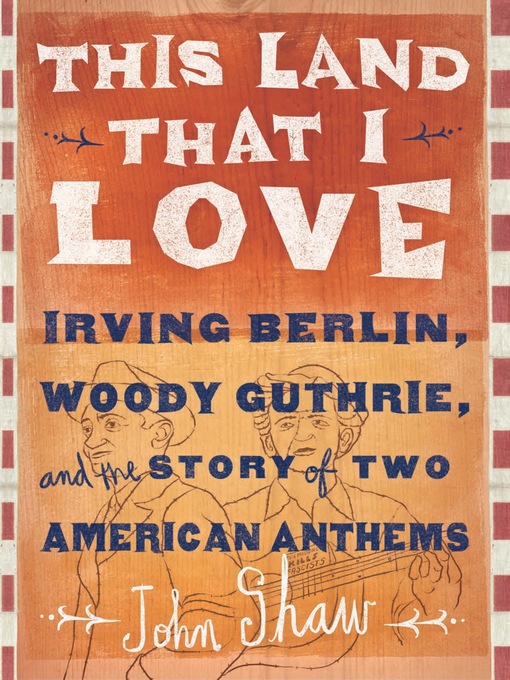- Manga Mania
- No wait, no problems
- What's new?
- Popular titles
- Check these out!
- See all ebooks collections

Woody Guthrie was having none of it. Near-starving and penniless, he was traveling from Texas to New York to make a new start. As he eked his way across the country by bus and by thumb, he couldn't avoid Berlin's song. Some people say that it was when he was freezing by the side of the road in a Pennsylvania snowstorm that he conceived of a rebuttal. It would encompass the dark realities of the Dust Bowl and Great Depression, and it would begin with the lines: "This land is your land, this land is my land."
In This Land That I Love, John Shaw writes the dual biography of these beloved American songs. Examining the lives of their authors, he finds that Guthrie and Berlin had more in common than either could have guessed. Though Guthrie's image was defined by train-hopping, Irving Berlin had also risen from homelessness, having worked his way up from the streets of New York.
At the same time, This Land That I Love sheds new light on our patriotic musical heritage, from "Yankee Doodle" and "The Star-Spangled Banner" to Martin Luther King's recitation from "My Country 'Tis of Thee" on the steps of the Lincoln Memorial in August 1963. Delving into the deeper history of war songs, minstrelsy, ragtime, country music, folk music, and African American spirituals, Shaw unearths a rich vein of half-forgotten musical traditions. With the aid of archival research, he uncovers new details about the songs, including a never-before-printed verse for "This Land Is Your Land." The result is a fascinating narrative that refracts and re-envisions America's tumultuous history through the prism of two unforgettable anthems.
-
Creators
-
Publisher
-
Release date
November 5, 2013 -
Formats
-
Kindle Book
-
OverDrive Read
- ISBN: 9781610392242
-
EPUB ebook
- ISBN: 9781610392242
- File size: 1783 KB
-
-
Accessibility
No publisher statement provided -
Languages
- English
-
Reviews

Loading
Formats
- Kindle Book
- OverDrive Read
- EPUB ebook
subjects
Languages
- English
Why is availability limited?
×Availability can change throughout the month based on the library's budget. You can still place a hold on the title, and your hold will be automatically filled as soon as the title is available again.
The Kindle Book format for this title is not supported on:
×Read-along ebook
×The OverDrive Read format of this ebook has professional narration that plays while you read in your browser. Learn more here.